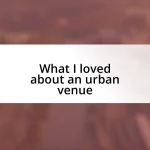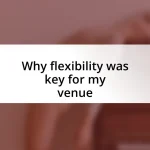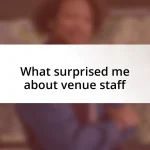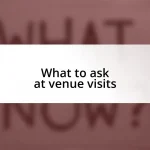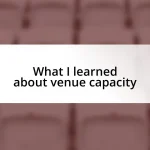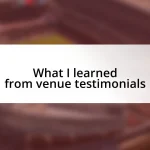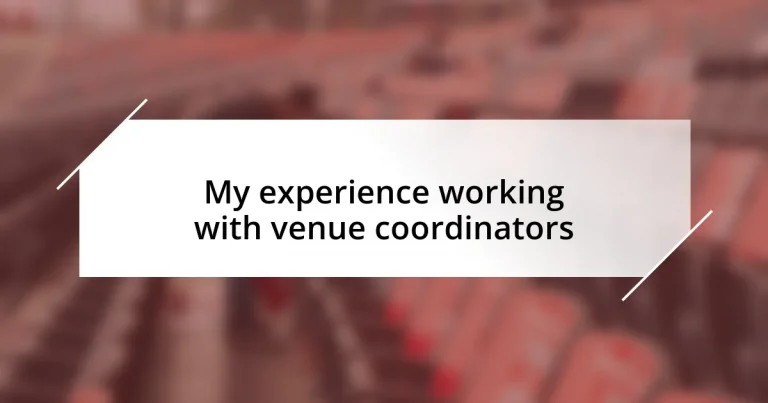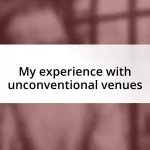Key takeaways:
- Choose a venue coordinator who understands your vision and fosters a partnership rather than a transactional relationship.
- Maintain clear and open communication, utilizing regular check-ins and visual aids to enhance understanding and collaboration.
- Manage expectations by being upfront about needs and recognizing the coordinator’s limitations; together, explore creative solutions.
- Celebrate small milestones during the planning process to keep the morale high and strengthen the partnership.
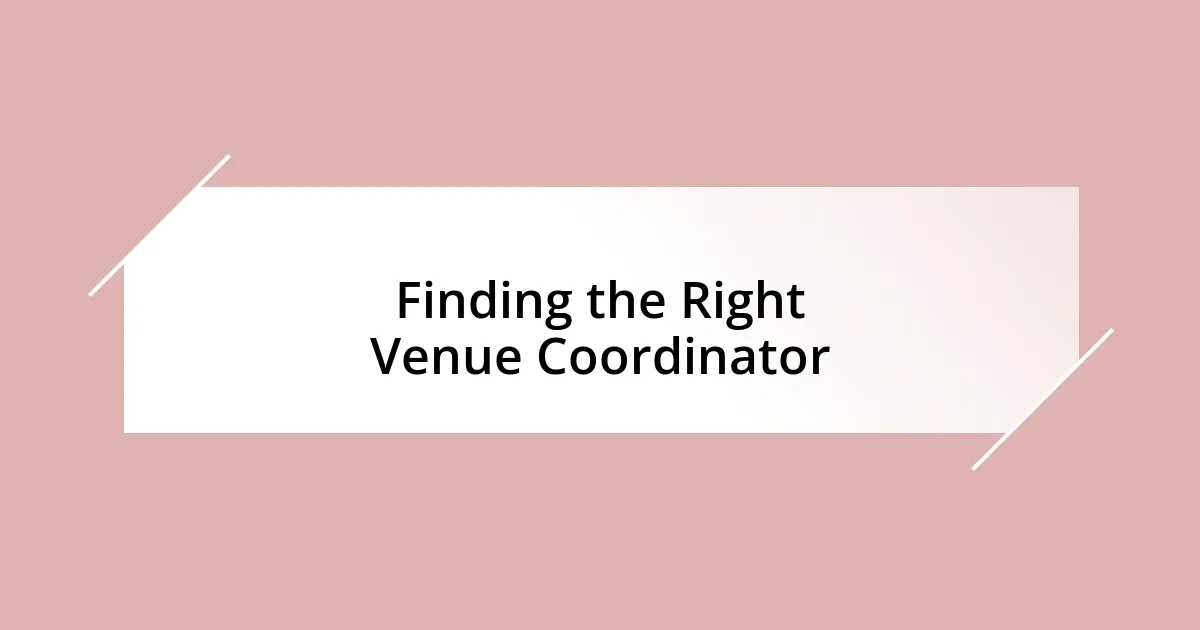
Finding the Right Venue Coordinator
When I first started searching for a venue coordinator, I felt a mix of excitement and anxiety. How do you know who will understand your vision? I learned to look for someone who not only has a solid track record but also takes the time to really listen. The right match should feel like a partnership rather than a transaction.
During my search process, I came across coordinators who, despite their impressive resumes, just didn’t click with me. I remember one meeting where I felt more like a checklist item than a couple with dreams. It made me realize how essential it is to find someone who genuinely connects with you and your unique story. After all, isn’t it your special day they’re helping to craft?
Ultimately, I realized the importance of asking pointed questions during consultations. Dive into their past experiences or how they handle unexpected challenges. I’ll never forget the coordinator who shared a story about handling a last-minute venue change—it gave me confidence in her problem-solving abilities. A good venue coordinator should inspire trust and excitement; think about what qualities you truly value.
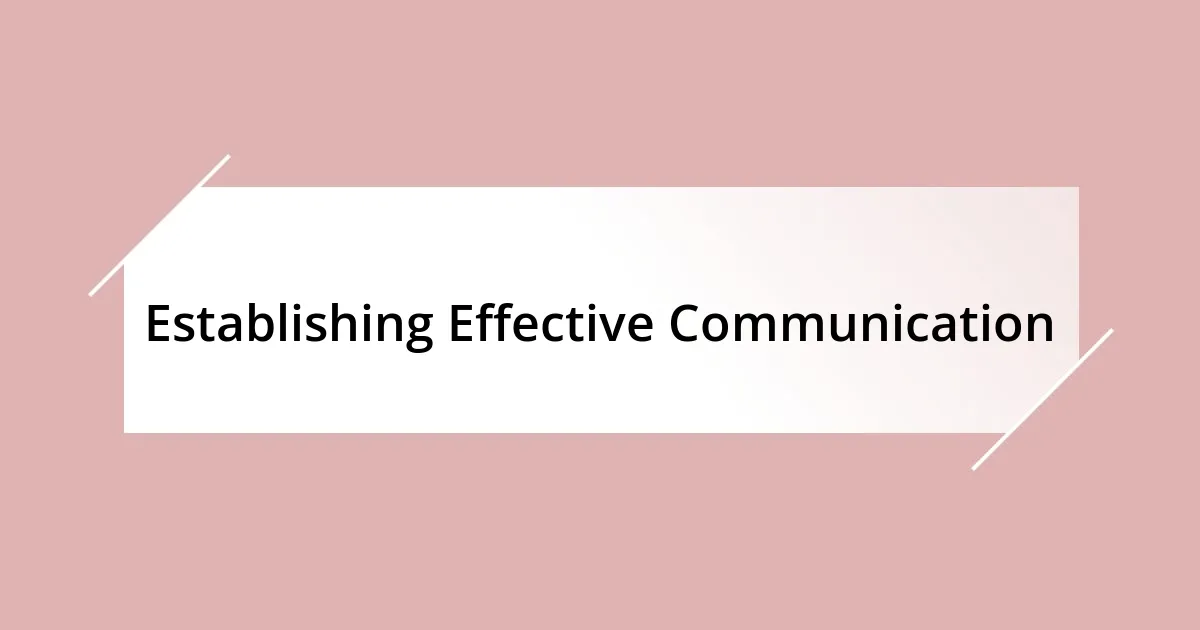
Establishing Effective Communication
Establishing effective communication with your venue coordinator is essential for ensuring that your vision comes to life. One crucial aspect I learned is to share my ideas openly, fostering a two-way dialogue. I remember one conversation where I expressed a concern about the layout, and the coordinator not only listened but offered creative alternatives that I hadn’t considered. That moment cemented my trust in her abilities, as I felt valued and understood.
To enhance communication, consider these key strategies:
- Be Clear and Specific: Articulate your vision and expectations, leaving no room for assumptions.
- Check In Regularly: Schedule updates to make sure everyone is on the same page, preventing surprises down the line.
- Use Visual Aids: Share images, diagrams, or mood boards to convey your ideas more effectively, transforming concepts into visuals.
- Encourage Feedback: Create a space for your coordinator to share their thoughts or concerns; collaboration often leads to the best outcomes.
- Express Appreciation: Acknowledge the coordinator’s efforts and creativity; little gestures can strengthen your working relationship significantly.
Building this kind of rapport not only alleviated my anxiety but also made planning an enjoyable and enriching process.
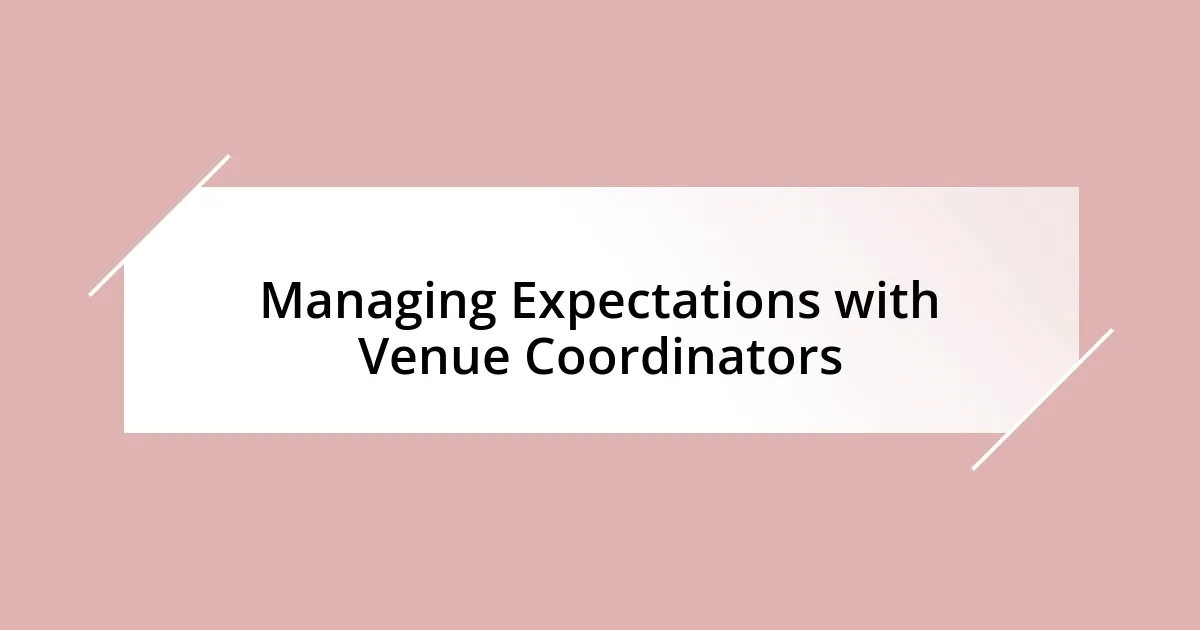
Managing Expectations with Venue Coordinators
Managing expectations with venue coordinators is crucial for a successful event. I found that setting clear boundaries and being upfront about my needs helped avoid misunderstandings. There was a moment when I expressed my ideal guest capacity, and my coordinator promptly outlined the venue’s limitations with honesty. This openness allowed us to find creative solutions, which ultimately made me feel secure in the planning process.
Understanding the coordinator’s limitations is just as important as communicating your vision. I recall a time when my expectations exceeded the venue’s capabilities. I wanted a grand setup that simply wasn’t feasible within the venue’s space. Instead of feeling discouraged, we brainstormed together and came up with an equally stunning alternative that suited the venue perfectly. It was a lesson in adaptability and trust, reinforcing how effective collaboration can lead to unexpected creative solutions.
Lastly, I discovered that regular check-ins significantly contributed to managing expectations. There were weeks when my excitement turned to anxiety, and I worried about the details falling through the cracks. Scheduling brief conversations just kept us connected and reaffirmed our direction. This mutual diligence created an atmosphere of trust, ensuring we were both on the same page and excited about the upcoming event.
| Expectation | Coordinator’s Role |
|---|---|
| Clarity in Communication | Facilitates understanding and ensures all details are covered. |
| Flexibility | Adapts to changes and offers creative solutions if obstacles arise. |
| Regular Updates | Keeps both parties aligned and reduces potential anxiety. |
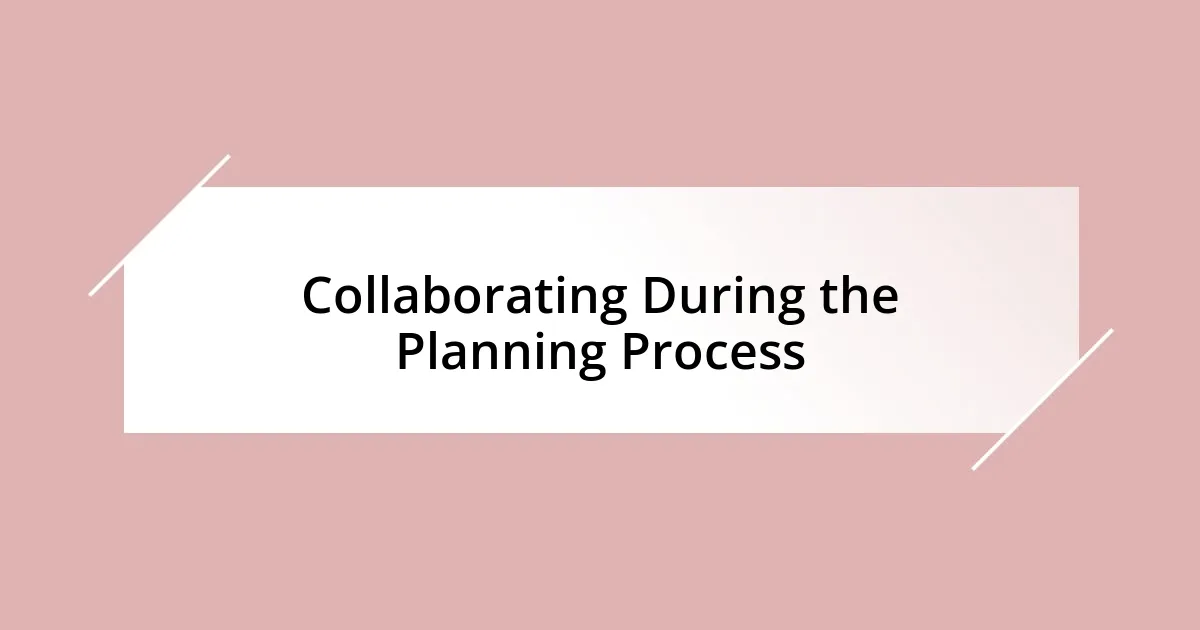
Collaborating During the Planning Process
Collaborating with my venue coordinator during the planning process was, without a doubt, a transformative experience. I recall discussing the theme of the event over coffee and finding myself genuinely excited when she suggested incorporating elements I hadn’t thought of. Have you ever felt that thrill when someone truly understands your vision and adds to it? It’s infectious and really propels the planning forward.
I learned that flexibility is not just a buzzword; it’s vital to a successful partnership. One time, I envisioned an outdoor ceremony but the weather forecast disrupted those plans. Instead of panicking, my coordinator calmly proposed an elegant indoor alternative, complete with beautiful lighting and decor that matched my original vision. In that moment, I realized how essential it is to trust your coordinator and remain open to new ideas—they can turn a potential disaster into an exquisite solution.
As our discussions continued, I found it helpful to document our progress. I started keeping a shared Google Drive folder where we could both drop in notes, images, and feedback. It became our collaborative space, and I felt a sense of ownership and investment. Doesn’t it feel good to have everything organized? It alleviated any lingering worries about forgotten details. This simple yet effective tool kept our collaboration streamlined and allowed us to focus on the more creative aspects of planning.
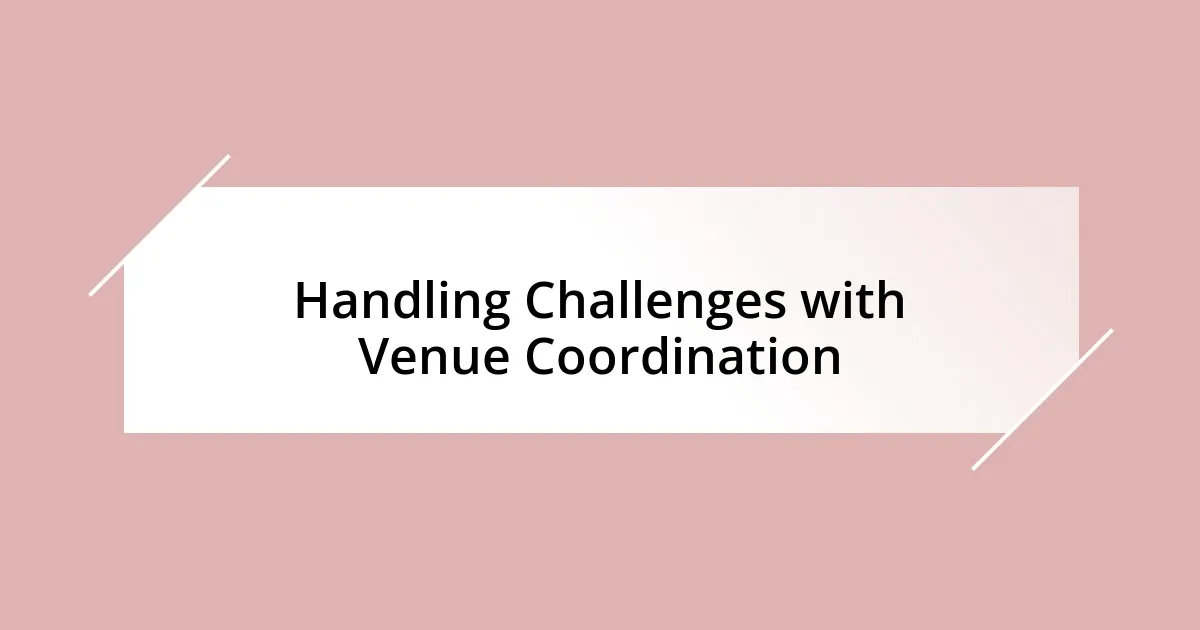
Handling Challenges with Venue Coordination
Handling challenges with venue coordination can sometimes feel daunting, but I’ve learned that staying calm is key. There was one instance where a major scheduling conflict threatened to throw our timeline off course. Instead of panicking, my coordinator suggested a series of alternative dates, which ultimately allowed us to secure the venue you truly wanted. In that moment, I realized that flexibility turns potential stressors into manageable obstacles.
Another challenge I encountered was navigating vendor restrictions. While I had a vision for specific caterers, the venue had its own list of preferred vendors. Initially, I felt frustrated, thinking this was a limitation of my options. But I took a breath, approached my coordinator with an open mind, and learned that there were fantastic options on the venue’s list. Some of these vendors not only met my expectations but exceeded them, offering unique takes on the dishes I had envisioned. It’s amazing how a bit of open dialogue can reshape anxiety into excitement, isn’t it?
Lastly, last-minute changes are part of the reality of event planning. I remember vividly when one of my key speakers canceled a week before the event, leaving me in a bit of a panic. My coordinator and I sat down, brainstormed alternatives, and even found a local expert who fit our theme perfectly. This experience taught me that challenges often present opportunities. By working together, my coordinator and I not only solved the immediate problem but also created a more engaging event than I had originally planned. The whole process reinforced the importance of having a sturdy support system in place.
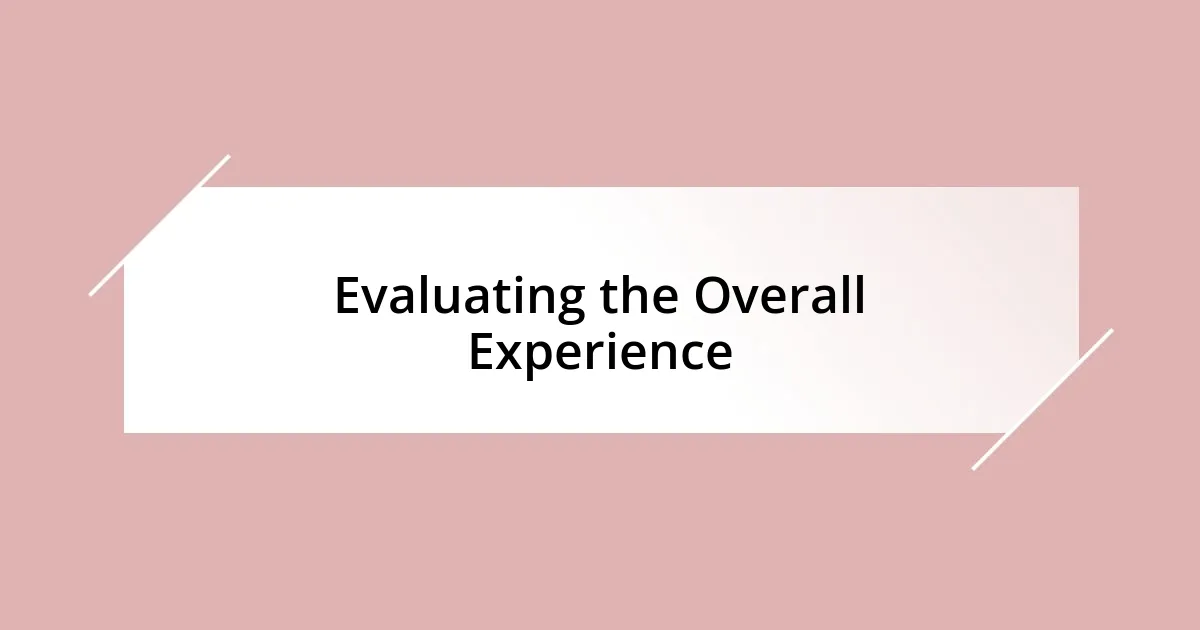
Evaluating the Overall Experience
When evaluating the overall experience with my venue coordinator, I can’t help but feel a sense of gratitude for the collaboration. One specific moment stands out: as we walked through the venue for the final walkthrough, her infectious enthusiasm breathed new life into the space. Suddenly, the blank walls and empty chairs transformed into the vibrant location that had once existed only in my imagination. Isn’t it interesting how someone else’s excitement can rekindle your own passion?
I also learned that communication truly shapes the experience. There were times when I thought I was being clear, only to later realize that assumptions had led to misalignments. A candid conversation cleared the air and aligned our visions. This taught me that fostering an environment of trust and openness can dramatically enhance the working relationship. Don’t you think that’s a vital part of any successful partnership?
Reflecting on my time with the coordinator, I found that celebrating the small milestones along the way was incredibly fulfilling. After confirming key elements like the caterer and the floral arrangements, we would take a moment to acknowledge our progress. This practice not only kept our spirits high but also reinforced the bond we were building. How often do we forget to celebrate the little victories in a project? It turns out these moments can make the experience more enjoyable and memorable.



